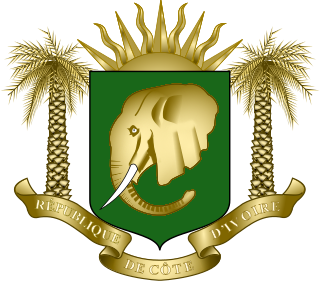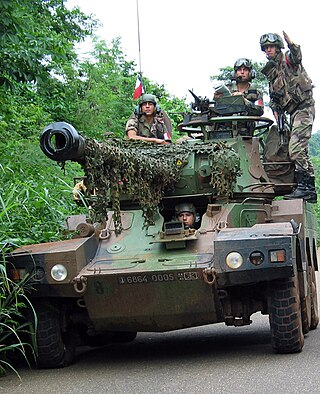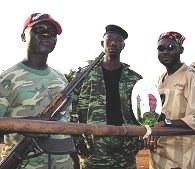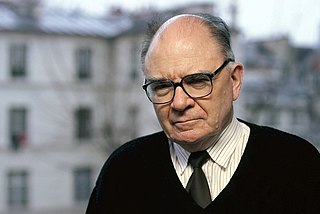
The Armed Forces of Côte d'Ivoire are the armed forces of Ivory Coast.
Human arrival in Ivory Coast has been dated to the Upper Paleolithic period, or at the minimum, the Neolithic period based on weapon and tool fragments, specifically polished shale axes and remnants of cooking and fishing. The earliest known inhabitants of Côte d'Ivoire left traces scattered throughout the territory. Historians believe these people were all either displaced or absorbed by the ancestors of the present inhabitants. Peoples who arrived before the 16th century include the Ehotilé (Aboisso), Kotrowou (Fresco), Zéhiri, Ega, and Diès (Divo).

Ivory Coast, officially the Republic of Côte d'Ivoire, also known as Côte d'Ivoire, is a country on the southern coast of West Africa. Its capital is Yamoussoukro, in the centre of the country, while its largest city and economic centre is the port city of Abidjan. It borders Guinea to the northwest, Liberia to the west, Mali to the northwest, Burkina Faso to the northeast, Ghana to the east, and the Gulf of Guinea to the south. Its official language is French, and indigenous languages are also widely used, including Bété, Baoulé, Dioula, Dan, Anyin, and Cebaara Senufo. In total, there are around 78 different languages spoken in Ivory Coast. The country has a religiously diverse population, including numerous followers of Islam, Christianity, and traditional faiths like Animism.
The First Ivorian Civil War was a civil conflict in the Ivory Coast that began with a military rebellion on 19 September 2002 and ended with a peace agreement on 4 March 2007. The conflict pitted the government of Ivorian President Laurent Gbagbo against a domestic insurgency led by the New Forces of Ivory Coast. Following the war, a second civil war (2010–2011) would begin over the results of the 2010 Ivorian presidential election.

Alasane Dramane Ouattara is an Ivorian politician who has been President of Ivory Coast since 2010. An economist by profession, Ouattara worked for the International Monetary Fund (IMF) and the Central Bank of West African States, and he was the Prime Minister of Côte d'Ivoire from November 1990 to December 1993, appointed to that post by President Félix Houphouët-Boigny. Ouattara became the President of the Rally of the Republicans (RDR), an Ivorian political party, in 1999.

Ivory Coast is one of the most pro-United States nations in Africa and the world, with 85% viewing the U.S. favorably in 2002, and rising to a high of 88% in 2007.

Women in Ivory Coast formed less than half the country's population in 2003. Their social roles and opportunities have changed since the time of French colonialism.

The following outline is provided as an overview of and topical guide to Ivory Coast:

note: map of india in the given picture is wrong.

The Constitution of Ivory Coast was approved by referendum on October 30, 2016, and officially adopted on November 8, 2016.

United Nations Security Council resolution 1479, adopted unanimously on 13 May 2003, after reaffirming Resolution 1464 (2003) on the situation in Côte d'Ivoire and resolutions 1460 (2003) and 1467 (2003), the council established the United Nations Mission in Côte d'Ivoire (MINUCI) after determining the situation in the country to be a threat to international peace and security in the region.

United Nations Security Council resolution 1528, adopted unanimously on 27 February 2004, after recalling resolutions 1464 (2003), 1479 (2003), 1498 (2003), 1514 (2003) and 1527 (2004) on the situation in Côte d'Ivoire, the council established the United Nations Operation in Côte d'Ivoire (UNOCI) for an initial period of twelve months.

United Nations Security Council resolution 1572, adopted unanimously on 15 November 2004, after recalling Resolution 1528 (2004) on the situation in Côte d'Ivoire, the council imposed an arms embargo on the country following recent violence and threatened further sanctions if Ivorian parties did not comply with their political commitments.

United Nations Security Council resolution 1633, adopted unanimously on 21 October 2005, after recalling previous resolutions on the situation in Côte d'Ivoire, the Council demanded the implementation of the Linas-Marcoussis, Accra III and Pretoria peace agreements by the signatories to those accords, as well as all relevant Ivorian parties concerned.

Jean-Yves Calvez was a French Jesuit, theologian, philosopher, economist, expert in Marxism and professor of social philosophy.
The following is a timeline of the history of the city of Abidjan, Ivory Coast.
In Ivory Coast, a country in West Africa, scientific output has been relatively modest. Scientists in Ivory Coast produced only 10 scholarly articles per million inhabitants in international journals in 2014, compared to a continental average of 20 per million. Between 2008 and 2014, scientists published mostly in biological sciences, followed by medical sciences, geosciences, agriculture and chemistry. The country also has few international collaborations, compared to the rest of the continent: whereas more than eight out of ten articles had a foreign co-author in most countries in 2014, the rate in Ivory Coast was 73%.
Ivory Coast is a sub-Saharan nation in West Africa. It is a representative presidential democracy where rights are protected in the constitution, international law, and common law. As a member of the African Commission on Human and Peoples' Rights, it is a party to the African Charter on Human and Peoples' Rights and a signatory to major international human-rights agreements. In 2011, the Second Ivorian Civil War saw increases in violence and human-rights abuses. Although progress has been made towards reconciliation, the trial of former first lady Simone Gbagbo suggests that the root causes have not been addressed; no one has been convicted of crimes against humanity. According to a 2018 Human Rights Watch report, "Ongoing indiscipline by members of the security services and violent army mutinies demonstrated the precariousness of the country’s newfound stability."
Simone Kaya was an Ivorian writer and nurse. She is considered a pioneer among women writers in Ivory Coast, the first woman to enter the country's literary sphere.

Ivorian nationality law is regulated by the Constitution of Ivory Coast, as amended; the Ivorian Nationality Code, and its revisions; and various international agreements to which the country is a signatory. These laws determine who is, or is eligible to be, a national of Ivory Coast. The legal means to acquire nationality, formal legal membership in a nation, differ from the domestic relationship of rights and obligations between a national and the nation, known as citizenship. Nationality describes the relationship of an individual to the state under international law, whereas citizenship is the domestic relationship of an individual within the nation. Ivorian nationality is typically obtained under the principle of jus soli, i.e. by birth in Ivory Coast, or jus sanguinis, i.e. by birth in Ivory Coast or abroad to parents with Ivorian nationality. It can be granted to persons with an affiliation to the country, or to a permanent resident who has lived in the country for a given period of time through naturalization.












